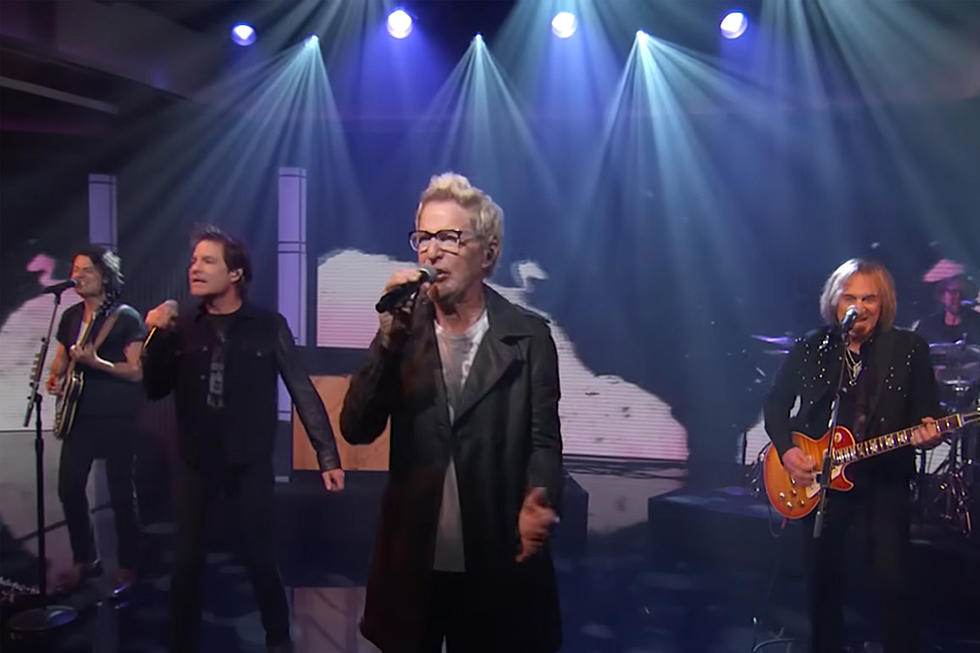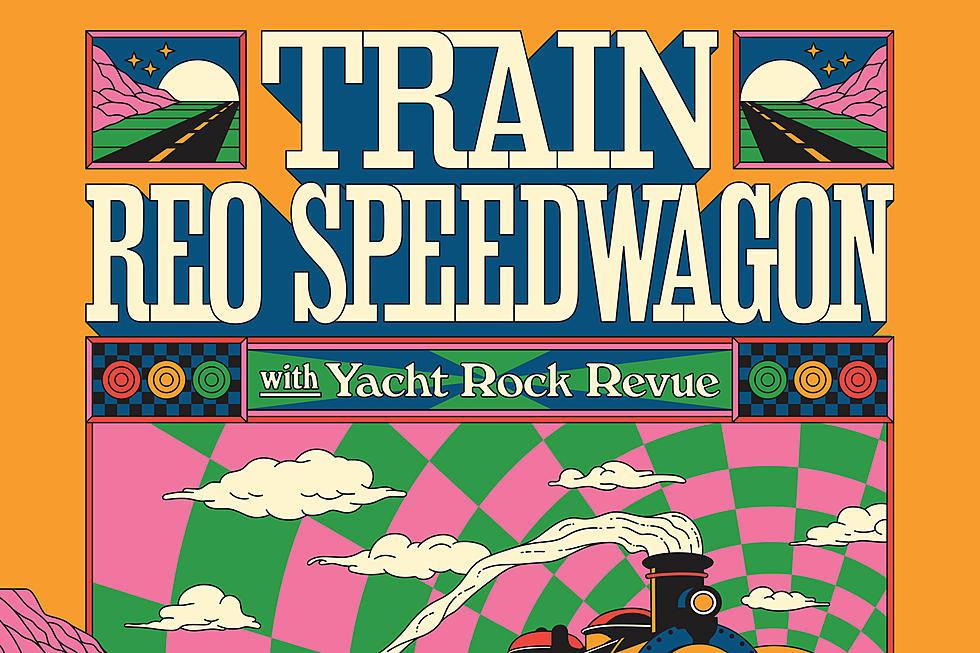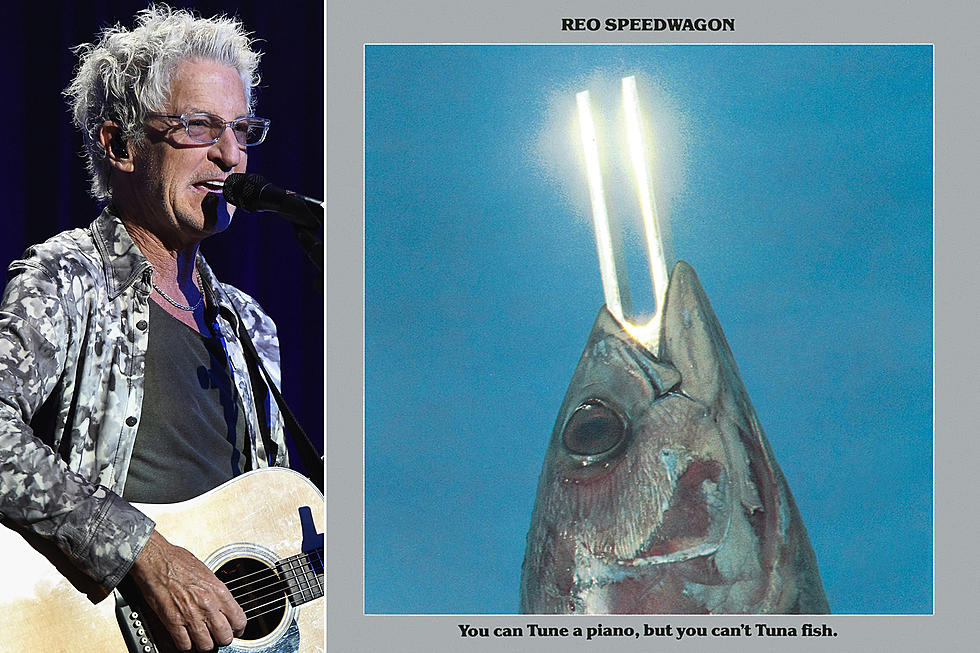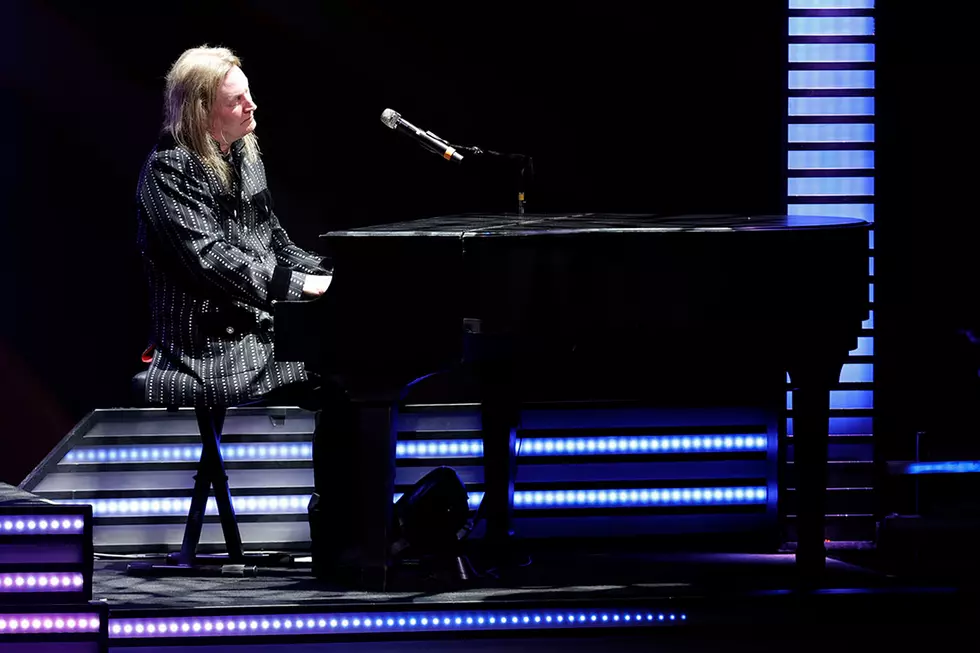25 Years Ago: REO Speedwagon Regroup With ‘The Earth, a Small Man, His Dog and a Chicken’
REO Speedwagon struggled to achieve their breakthrough for nearly a decade before finally hitting No. 1 with 1980's Hi Infidelity. As they soon discovered, it's often just as difficult to stay on top as it is to make it there in the first place.
Although the band continued to crest the charts in the years following Hi Infidelity, the years of constant recording and touring clearly started to take their toll. After 1987's somewhat indifferently received Life as We Know It, those strains manifested themselves in the twin departures of guitarist Gary Richrath and drummer Alan Gratzer. Both absences left deep impacts in the lineup, albeit in different ways: Gratzer's retirement left keyboard player Neal Doughty as the sole remaining founding member of REO Speedwagon, while the band's parting of the ways with Richrath deducted a key component from its multi-platinum sound.
In fact, while Richrath's songwriting contributions had dwindled in the years leading up to his 1989 departure, the tension between his harder-edged playing style and the folkier influence exerted by singer Kevin Cronin had produced many of the most satisfying moments on REO Speedwagon's bestselling albums. The group closed out the '80s as a demonstrably different band, in other words — but they resolved to move on quickly, adding drummer Bryan Hitt and guitarist Dave Amato before starting sessions to record what would become their 13th studio album.
"We auditioned eight drummers and I think Bryan was the first one to audition. I came offstage and pulled Kevin aside and I said, 'Do we really have to keep doing these auditions? Because Bryan is the right guy,'" recalled Doughty. "Dave was also the first guy. He came over to Kevin's house and we went back in his studio and we just jammed for a half an hour — there wasn’t much to it. We stopped so fast that I think Dave thought that he didn’t get the job."
Listen to 'You Won't See Me'
According to Amato, his invitation to play with the band came courtesy of his connection to keyboard player Jesse Harms, who was also in the process of entering the REO lineup.
"Jesse Harms used to play keyboards for Sammy Hagar, and he and I were trying to put a band together," Amato told Guitar World. "At the same time, he was also busy writing songs with Kevin [...] Gary had gone by then and REO didn’t want to put out a 'cattle call' for guitarists, so Jesse mentioned me to Kevin. I remember going down to Kevin’s house and playing a couple of REO songs and a few of the demo songs they were working on. A few hours later, we were all hanging out playing basketball on Kevin’s court when he offered me the spot in the band. It’s a good story and was just meant to be."
The chemistry between the new band members came together easily, but as the '90s dawned, REO Speedwagon's standing in the rock marketplace was far less stable. After rising to prominence as a heavy-touring blue-collar band in the late '70s and early '80s, they'd drifted steadily toward Top 40 balladry as the years wore on; their most recent release, the 1988 compilation The Hits, included a pair of slick new love songs, "I Don't Want to Lose You" and "Here with Me," that seemed to indicate an eagerness to keep plowing ahead with softer songs more in the vein of "Can't Fight This Feeling" and "In My Dreams."
There also seemed to be a certain amount of Speedwagon fatigue setting in among its longest-tenured members. Cronin and bassist Bruce Hall had taken to blowing off steam with a tongue-in-cheek side project they called the Strolling Dudes, and Hall later admitted that the late '80s weren't his most artistically inspired period.
"That right there was an odd time," Hall recalled during a 2012 interview with Rock Show Critique. "I was going through some things in my life — I was writing songs but there wasn’t too much that was I was real happy with. Basically, I didn’t feel like I had enough to present."
It all added up to a period of major change for REO Speedwagon — one reflected in the 11 tracks the new lineup recorded for that 13th studio LP, which arrived in stores Aug. 30, 1990 with the befuddling title The Earth, a Small Man, His Dog and a Chicken.
Hall was willing to concede that REO didn't do itself any favors with the album title. "We were looking for album covers and we had this artist who was drawing pictures," he explained. "One of them he showed us was that one, and he simply called it 'The Earth, a Small Man, His Dog and a Chicken.' He was thinking that we would change it to something else, but we’ve always been interested in funny or different kind of album titles, like You Can Tune a Piano But You Can’t Tuna Fish — that kind of stuff. For some reason Kevin thought it was hilarious, and I’m going, 'I’m not too sure about that.' But he kind of won me over. It was kind of funny. So we put it out there."
Listen to 'Go for Broke'
While it's definitely an album title that's hard to forget, Chicken's oddball name unfortunately overshadowed one of the livelier sets of songs REO had recorded in years. The record still made plenty of room for the adult contemporary ballads that had helped the group hit multi-platinum, but it also benefited strongly from the fresh presences of Amato, Harms, and Hitt, and included a number of more aggressive uptempo tracks, such as "You Won't See Me," "L.I.A.R.," "Go for Broke," and the No. 6 rock hit (and Harms composition) "Live It Up."
The group's sound also shifted, with Harms' presence on keys freeing up Doughty to highlight his Hammond playing, which gave the record a slightly earthier feel complemented by an increased focus on acoustic guitars. It'd be a mistake to call Chicken a rootsy record — co-producer Tom Lord-Alge added a layer of gloss at least marginally in keeping with REO's mid-to-late '80s output — but it did point a potential way forward for the group after losing Richrath and Gratzer.
Sadly for the band, few fans would ever hear any of it. The Earth, a Small Man, His Dog and a Chicken peaked at a lowly No. 129 — the worst showing for a Speedwagon effort since 1976's R.E.O. — sounding the death knell for the group's long tenure with Epic Records, where they'd recorded since their debut effort in 1971. After one last contract-fulfilling compilation release the following year, they started a new chapter, one that would see REO focusing more on steady touring than recording or releasing new material.
Since Chicken's quick commercial death, REO Speedwagon have released only two studio albums of new original material — 1996's Building the Bridge and 2007's Find Your Own Way Home — and neither have charted. Still, for Cronin, the group's steady perseverance has been its own reward.
"I know for us, right around 1990, right when the whole Seattle scene exploded with Kurt Cobain and Pearl Jam, all those bands that came out and blew everybody out of the water — and, honestly, I thought they were great — the 'classic rock' bands as we’re called today, no one knew what to make of it," Cronin told the Aquarian. "A lot of bands disbanded. Well, we never did. We kept playing. And it got ugly there for a while. We were touring in South America, having hard times getting gigs in the States. For REO Speedwagon, that was quite a jolt to the system, but we continued."
See the Yearbook Photos of Kevin Cronin and Other Rockers
The 10 Worst Rock and Roll Hall of Fame Snubs
More From Ultimate Classic Rock









